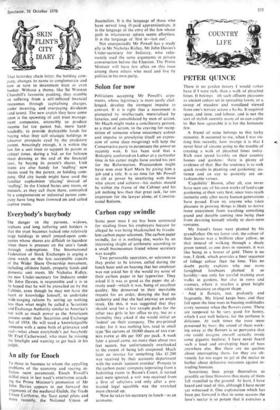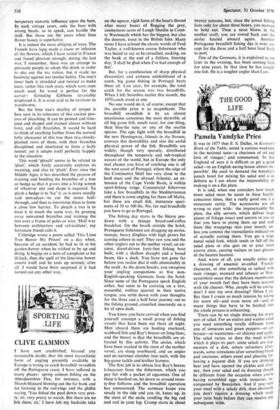PETER QUINCE
There is no garden luxury I would rather have if I were rich, than a walk of pleached limes. It belongs ith such affluent pleasures as ancient cedars set in spreading lawns. or a sweep of meadow and woodland viewed from one's terrace across a ha-ha. It required space, and time, and labour, and is not the sort of stylish amenity many of us can aspire to. But how agreeable it is for the fortunate few.
A friend of mine belongs to this lucky minority. It occurred to me, when I was vis- iting him recently, how strange it is that I never hear of :anyone going to the trouble of creating a walk of pleached limes today. Rich men spend lavishly on their country homes and gardens: there is plenty of evidence of that. But the tendency is to seek quick results in planting and gardening: pa- tience and an eye to posterity are un- fashionable virtues.
'Capability' Brown, after all, can never have seen any of his own works of landscape gardening at their very best, since trees reach maturity only after many human generations have passed. Even so. anyone who takes pleasure in growing things is likely to derive more enjoyment from watching something grand and durable coming into being than from devoting himself wholly to short-term ventures.
My friend's limes were planted by his grandfather. On my latest visit, the colour of their leaves was a brilliant clear yellow, so that instead of walking through a shady green tunnel, as one does in summer, it was like being in a bower of gold. There is no tree, I think, which provides a finer sequence of foliage colour than the lime. This no doubt partly explains why our more farsighted forebears planted it so lavishly—not only for careful training over walks in gardens, but also in rows and avenues, where it reaches a great height while retaining an elegant shape.
And it flowers, too, profusely and fragrantly. My friend keeps bees, and they fall upon the lime trees in buzzing multitudes every summer when the flowers come. These are supposed to be very good for honey, which I can well believe, for the perfume is delicious. At such times the trees seem possessed by bees: the sound of them work- ing away at the flowers is so pervasive that one could imagine oneself actually inside some gigantic beehive; I have never heard such a loud and enveloping buzz of bees anywhere else. But there are no qualms about interrupting them: for they are ob- viously far too eager to get at the nectar to bother about defensive measures against in- truding humans.
Sometimes bees gorge themselves so greedily on lime blossoms that many of them fall stupefied to the ground. At least. I have heard and read of this, although I have never yet witnessed it. One explanation which has been put forward is that in some seasons the time's nectar is so potent that it exercises a
temporary narcotic influence upon the bees. In such vintage years, only the bees with strong heads, so to speak, can handle the stuff. But those are the years when lime flower honey is superlative.
It is indeed the most obliging of trees. The French have Icing made a tisane or infusion of the flowers, which I have tasted in France and found pleasant enough; during the last war, I remember, there was an attempt to persuade people to adopt this drink in order to eke out the tea ration, but it made no headway against our insular habits. The tree's inner bark is shredded and twisted to make mats, rather like rush mats, which were once much used. Its wood is perfect for the carver: Grimling Gibbons invariably employed it. It is even said to be resistant to woodworm.
But the lime tree's docility of temper is best seen in its tolerance of this ancient pro- cess of pleaching. It can be pruned and trim- med, and shaped and trained almost without limit, and still flourishes. It would be hard to think of anything further from the normal lofty character of this tree than two closely- , planted rows of them, with their branches disciplined and interlaced to form a leafy tunnel; yet it adapts itself perfectly happily to the situation.
This word 'pleach' seems to be related to 'plait', which fairly accurately explains its meaning, and also to 'plash'. Ever since the Middle Ages, it has described the process of training and bending the branches of a tree or hedge so that it grows into a living screen of whatever size and shape is required. To plash a hedge is to lay' it, as is more usually said nowadays—to cut the stems half- through, and then to intertwine them to form a close low barrier. To pleach a tree is to treat it in much the same way, by pruning away unwanted branches and training the rest over a frame of poles or wire. 'Half way between architecture and sylviculture', my fortunate friend calls it.
Coleridge wrote a poem called 'This Lime Tree Bower My Prison' on a day when, because of an accident, he had to sit in his garden-bower when he wished to be up and doing. It begins on a note of complaint at his ill-luck, then the spell of the lime-tree bower asserts itself and he ends up serenely after all. 'I would have been surprised if it had turned out any other way.











































 Previous page
Previous page